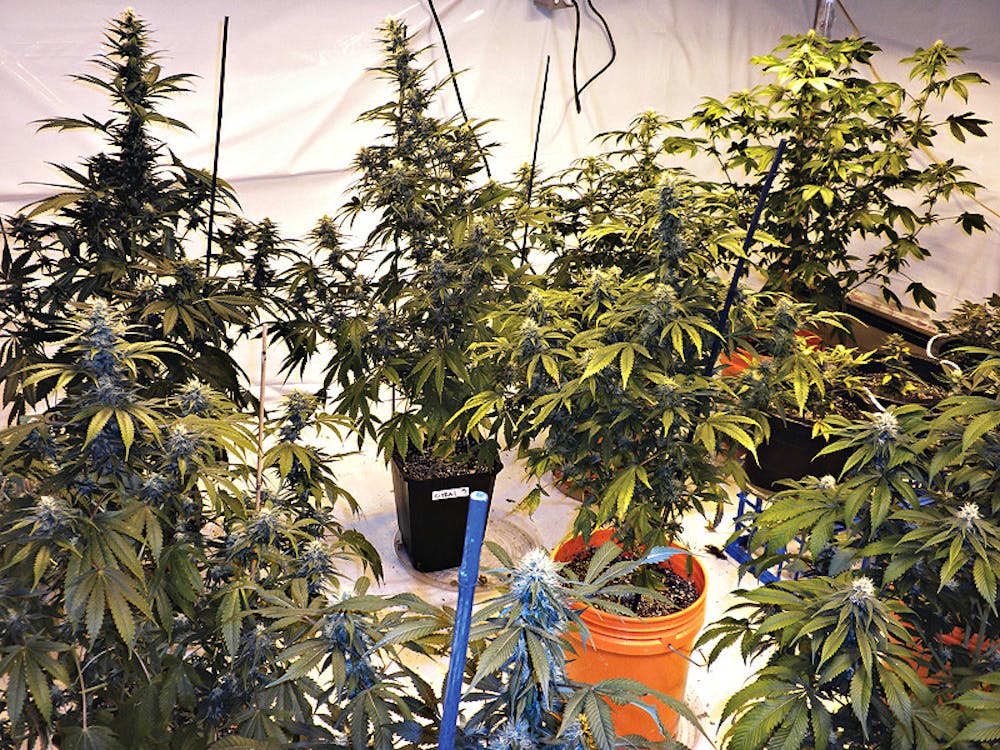The Summit Medical Compassion Center, Rhode Island’s third and final medical marijuana dispensary, will soon open for use by registered patients in the state.
Though the Providence Journal reported last week that the center would open Nov. 10, Terence Fracassa, Summit’s legal counsel, confirmed that the actual opening date remains to be decided but is tentatively slated for the end of next week. “It was just a miscommunication,” Fracassa explained.
Delays and setbacks are nothing new for Rhode Island’s dispensaries. As Napoleon Brito, Summit’s general manager, put it, they’ve had their share of “growing pains.”
Rhode Island legislators approved the medical marijuana law in 2006, and three dispensaries — the maximum number allowed by R.I. law — were approved in 2011. But the program was suspended for a year by Gov. Lincoln Chafee ’75 P’14 P’17 over concerns that state employees could be prosecuted under federal law prohibiting marijuana distribution. After revisions were made to the medical cannabis law to lessen this risk, Rhode Island’s first dispensary, the Thomas C. Slater Compassion Center, opened in April 2013.
Greenleaf Compassionate Care Center in Portsmouth opened about six weeks later. “There were all sorts of setbacks, and it took us four years to do it, but since we’ve been open it has been smooth sailing,” said Seth Bock, Greenleaf’s founder and CEO, of the lengthy process of opening the business.
According to the Rhode Island Department of Health, the number of registered patients in the state has been growing rapidly, jumping from 6,720 to 9,668 patients in the past 11 months alone. RIDOH figures show that the number of patients currently using Slater and Greenleaf far exceeds the original projections for each dispensary, with 4,781 patients at Slater and 1,647 at Greenleaf.
“We’ve never run out of medicine, so I guess we’ve done well,” Bock said. “But it has been challenging at times … It’s a very unique industry, and with it comes some challenges that are pretty unique as well.” These challenges include having to work with caregivers to distribute medicine.
Legal and logistic challenges have delayed Summit Medical Compassion Center’s opening over a year longer than the other state center openings. Fracassa explained that when the governor suspended the program, Summit was unable to hold onto its original site and had to relocate. Within the limits of its licensed area, the center had difficulty finding new real estate for both the dispensary and the cultivation facility, especially during “a time when it was difficult to find landlords and owners,” he added. The new dispensary is now located at a facility in a commercial plaza in Warwick. Customer projections for Summit have subsequently been adjusted down from 8,000 planned customers within three years to 1,610 in two years, according to the Journal.
But “as times change, and as patients and people become more educated about medicinal marijuana as an alternative pain medicine, I think people are looking at it as a more viable alternative to opiates,” Fracassa said.
Rhode Island is one of 23 states, in addition to the District of Columbia, that allows the state-regulated sale of medical marijuana. The RIDOH lists certain “qualifying debilitating medical conditions” approved for treatment by the drug; these include cancer, glaucoma, HIV/AIDS, Hepatitis C and chronic or debilitating conditions resulting in severe pain, nausea or seizures. Traci Green, assistant professor of emergency medicine and epidemiology, whose research experience includes drug abuse and addiction, said the drug can also help control weight and regulate obesity-related disorders.
In Rhode Island, criticism of the medical marijuana program and more recent legislative efforts to legalize marijuana for recreational use often center around the harm the drug poses to adolescents. At a forum held at the Ray Conference Center in Providence this September, a panel of medical experts cautioned against accepting marijuana as “harmless,” saying that states permitting medical marijuana have seen an increase in recreational use as well, the Journal reported.
Green said that in debates about marijuana legalization, it is important to recognize the difference between medical marijuana use and recreational use. “We don’t have enough information yet” on the effect the availability of medical marijuana will have on public perception of marijuana use, especially for adolescents, she said. “Ultimately I think that we can do a lot to mediate that by clarifying the harms for young people and being straightforward. There is plenty of science that says young minds are negatively affected by marijuana, but also that there are great benefits for minds and bodies with chronic diseases and pain.”
The bigger concern, Green said, is making sure patients get access to their medication, whether that medication be “opiates or marijuana or whatever else.”
“The more controlled this process is, the harder it is for patients to get their benefits,” she added.

ADVERTISEMENT




